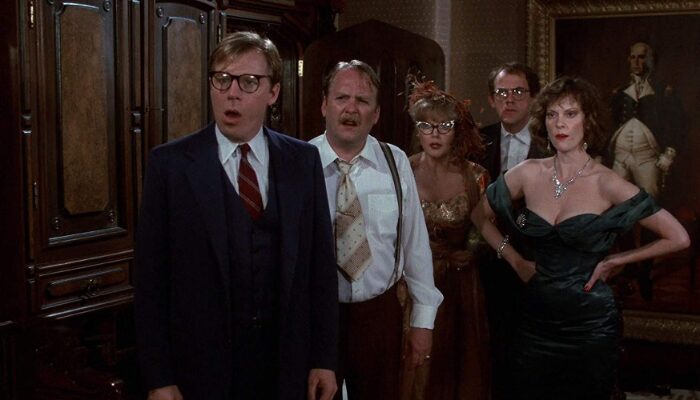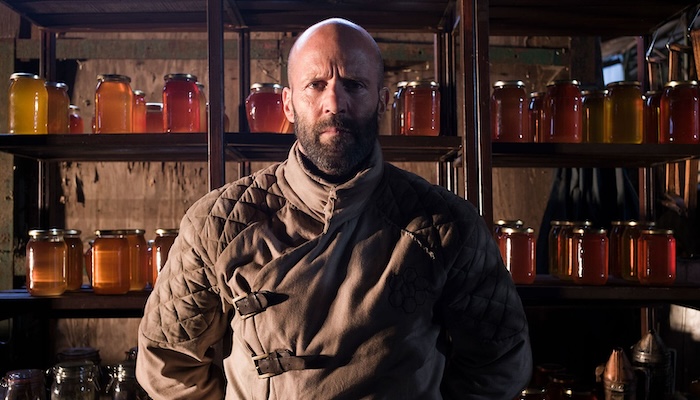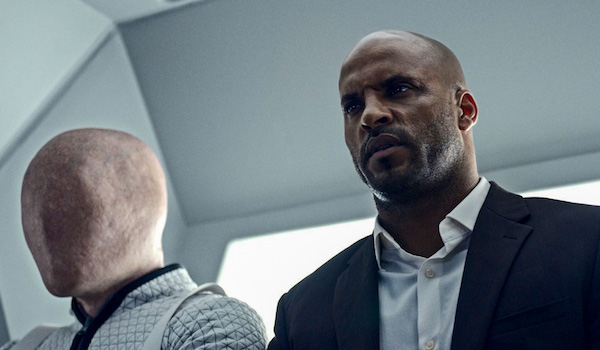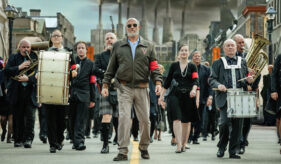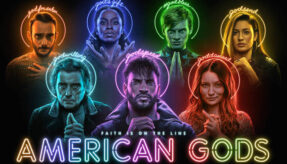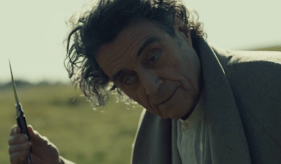TV Review: AMERICAN GODS: Season 1, Episode 1: The Bone Orchard [Starz]
American Gods The Bone Orchard Review
Starz‘s American Gods: Season 1, Episode 1: The Bone Orchard was the beginning of a colorful odyssey across America between a God and a member of humanity (though the former was unrevealed). Shadow Moon (Ricky Whittle) didn’t realize it when he accepted the too-good-to-be true job offer but he had just enlisted in the army of a God. It was unfortunate that Moon was not a fan of Quentin Tarantino and had not seen Inglourious Basterds i.e. “we hear a story too good to be true… It ain’t.”
The Bone Orchard made it easy to see why Moon eventually (and begrudgingly) accepted Mr. Wednesday (Ian McShane)’s job offer, even though both men were strangers to each other. Moon saw a kindred spirit in Mr. Wednesday (beneath the surface elements he didn’t like about Mr. Wednesday), someone whom would not look down on him because of his previous place of residence. What Mr. Wednesday saw in Moon, besides a person with few positive prospects and nothing to lose, was left an enigma throughout the entirety of The Bone Orchard.
Also left unclear in The Bone Orchard was Moon’s potential role in what was to come between the old gods and the new gods. Was Moon an unwitting pawn or was he being groomed for a fighting role à la Immortals? Either way, Moon was kept virtually in the dark for the entire episode. When two other Gods, one old, and one new, made contact with Moon during The Bone Orchard, the inception of that cloud of naïveté being ripped away began. Mad Sweeney (Pablo Schreiber) toyed with Moon and his ignorance, showing off an ability that no human being could possibly possess then explained it away as a magic trick e.g. “pulling them out of the air” (to paraphrase). With Technical Boy (Bruce Langley), there was no pretense or games. Moon was in Technical Boy’s court and integrated by its King. Moon’s flippant responses were entertaining but foolhardy and hard to believe given the situation. When an electronic device attaches itself to your face and a person materializes in front of you, you have just wandered into an unprecedented event yet Moon treated it as though it were common. Like he was eating a bowl of soggy cereal on Sunday morning or something equally as trivial. Only if Shadow Moon had truly seen it all à la Doctor Manhattan, had seen everything that the world and the universe had to offer (and Moon hadn’t) would that reaction have been remotely possible.
Shadow Moon, character-wise, was almost entirely vapid during The Bone Orchard. His motivation, his love for his wife Laura Moon (Emily Browning), was clear. He was also pugnacious but outside of those two key elements, Moon was virtually empty as a character. It was hard to root for an empty shell during The Bone Orchard. The robots in Westworld were imbued with far more personality than Shadow Moon during The Bone Orchard. Hopefully this deficiency will change as the series progresses, unless Shadow Moon is not really the main protagonist. Perhaps its Mr. Wednesday. Perhaps Shadow Moon is only the narrative’s bridge character. That was and is a distinct possibility.
The lack of strong characterization found in Shadow Moon was not true of the other characters in The Bone Orchard. Mr. Wednesday was charismatic, Mad Sweeney (who may or may not have been a leprechaun) was an attention-seeker, and patrician Technical Boy emanated cool.
The look of American Gods, from the vantage point of The Bone Orchard, was of high-production value (e.g. the dream sequences) filtered through an artist’s eye. The viewer saw flourishes of specific on-screen decisions regarding painting a scene with a lens (like Terrence Malick) instead of simply filming one. The problem was that the narrative of The Bone Orchard was not equal to its vibrant visuals.
Beside the visuals in The Bone Orchard, Bilquis (Yetide Badaki)’s sex scene added a whole new, and needed, level of depth to The Bone Orchard. There was a human belief system in place i.e. religion that some of the old Gods had learned to do without (perhaps Mr. Wednesday) but not Bilquis. She obviously missed her glory days. Since Bilquis wanted people to worship her again, why didn’t she leave her new supplicant alive? Why did she devour, in a very creative way, a man that had begun to worship her? It seemed like a counter-intuitive tactic, especially with all of the work that she put into getting her new supplicant.
Though Mr. Wednesday had more dialogue in The Bone Orchard and was far more flamboyant, it was Bilquis that intrigued. Like any good writer knows, its better to show the reader or viewer what you are driving at than simply telling them. Bilquis did so in The Bone Orchard.
Leave your thoughts on this American Gods: Season 1, Episode 1: The Bone Orchard review and this episode of American Gods below in the comments section. Readers seeking more TV show reviews can visit our TV Show Review Page, our TV Show Review Twitter Page, our TV Show Review Facebook Page, and our TV Show Review Google+ Page. Want up-to-the-minute notification? FilmBook staff members publish articles by Email, Twitter, Tumblr, Google+, and Facebook.
Related Articles
FilmBook's Newsletter
Subscribe to FilmBook’s Daily Newsletter for the latest news!





